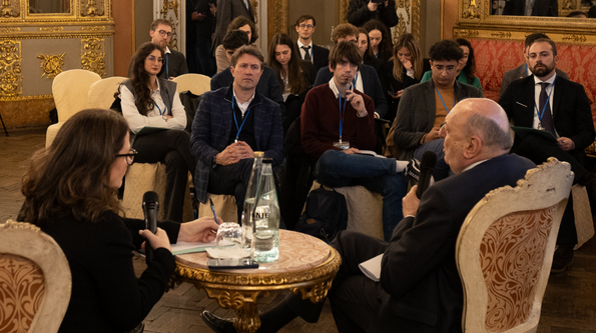

Palazzo Borghese
via Ghibellina 110 - Florence
C.F. 94312660486
P. IVA 07411980480
Training Offer
Copyright 2024 - European School for Young Leader - All rights Reserved - Powered by Webbidu Digital Minds
An advanced training course with a mix of theory and practice to develop local competence and a European vision. Training sessions based on strategic keywords, meetings with experts and a 'learning by doing' approach.

Teachers and Class Schedule
Methodology
Akadémeia's training methodology combines theory and practice to offer a complete experience.
Structured around key words that reflect the challenges of the future, training includes lessons, simulations and direct involvement in projects, according to a ‘learning by doing’ approach.
This path aims to develop concrete skills and a global vision, in line with the needs of modern public leadership.


Methodology: from the Scientific Committee to Learning by doing
Quality assurance
“For a new generation of local administrators”
The Scientific Committee and the Board of Directors of the Association have the task to guarantee the scientific and academic consistency of the programme and the presence of a wide variety of points of view. The course will thus allow participants to understand the complexity of the topics covered through an in-depth, theoretical and practical, global and local, strategic and operational analysis.
Learning by doing
The experts
This mix of methodologies and relationships based on Learning by doing allows participants to improve practical and theoretical skills, preparing them to face the challenges of their role more effectively.
For each teaching module, experts from different disciplines will be involved, thus contributing to an enrichment of the debate and the formulation of more innovative and applicable solutions.

Academic Programme Structure
Two sessions per year
The School of European School for Local Government organizes two sessions each year: one in spring and one in autumn. Each session is attended by up to 50 young local administrators under 35. The first session is reserved to Italian students, the second is open to all European students (including Italian ones).
A mix of online and in-person participation
The school offers multiple options to facilitate your attendance. Each session is structured in four monthly appointments, characterized by hybrid attendance. Online lessons take place on a web-platform entirely dedicated to the exchange of educational materials and documents, to facilitate interaction between participants and access to useful resources for their learning path.

Different approaches and points of view
Each session features multiple speakers, ensuring a variety of different perspectives and approaches on the topics covered.
For each teaching module, we involve administrative, academic, technical, political and entrepreneurial high profile representatives, as well as special guests and keynote speakers.
Small groups, for personalized support
Participants are divided into groups. Each group can rely on a coach or facilitator who is in charge of supporting and guiding them both in person and through digital tools, throughout the entire training course.

2025 Calendar
The academic calendar is organized in two annual sessions – spring and autumn – with in person and online appointments.
Each session includes a mix of lessons, workshops, and open discussion moments. This alternation of methods allows participants of maintain constant commitment and delve deeper into the topics covered, allowing flexible but intensive training.
Spring Session 2025
Hybrid attendance
- 28 February - 1 March (in-person)
- 14-15 March (online)
- 28-29 March (online)
- 11-12 April (in-person)

Autumn Session 2025
Hybrid attendance
- 10-11 October (in-person)
- 24-25 October (online)
- 07-08 November (online)
- 21-22 November (in-person)




Teaching Module and Syllabus
Module
Spring session 25
The spring session (February-April 2025), will address the following macro themes:
I. Environment and Energy (28/02 - 01/03)
II. Security and Civil Protection (14/03 - 15/03)
III. Social and Civic Economy (28/03 - 29/03)
IV. Territorial Cohesion, Urban and Inner Areas (11/04 - 12/04)

Teaching includes various learning moments for each macro-subjects: keynote speakers, contributions by national and international speakers, practical exercises, simulations and good practices sharing.
In other words, we adopt a multidisciplinary approach that alternates:
Study Plan
Spring session 25

February 28 - March 01, 2025
in person
Environment and Energy
- European Policies for the Environment
- Energy Transition
- Sustainable Territorial Management



March 14 - March 15, 2025
online
Security and Civil Protection
- European Policies for Safety of People and Territories
- Urban Security, Emergencies, and Social Sustainability in the Cities
- Territory Protection and Emergency Management
28 March - 29 March 2025
online
Social and Civil Economy
- European Policies for the Economy and the Internal Market
- European Economic and Social Model
- Urban Economy in Smart Cities


April 11 - April 12, 2025
in person
Territorial Cohesion, Urban and Inner Areas
- European Policies for Cohesion
- Inner and Urban Areas
- Sustainable Mobility

